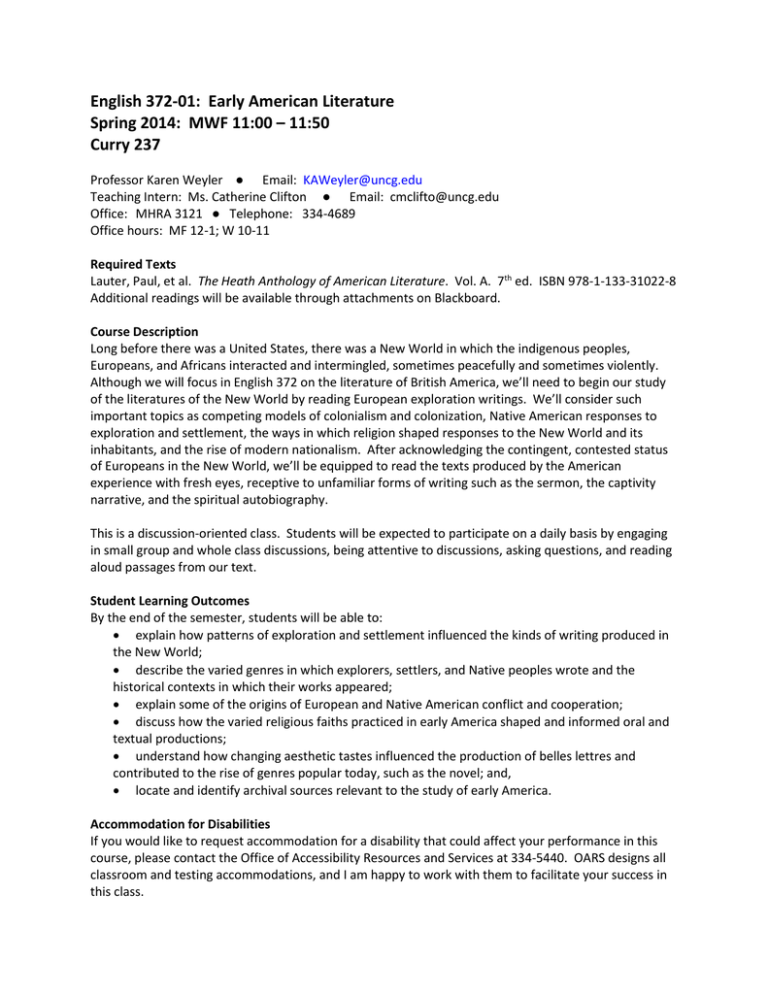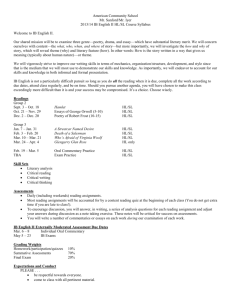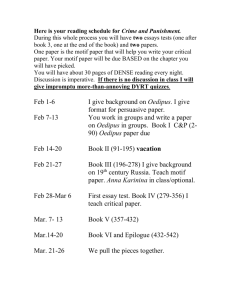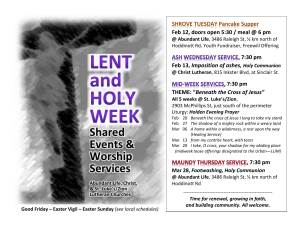372-01. Weyler
advertisement

English 372-01: Early American Literature Spring 2014: MWF 11:00 – 11:50 Curry 237 Professor Karen Weyler ● Email: KAWeyler@uncg.edu Teaching Intern: Ms. Catherine Clifton ● Email: cmclifto@uncg.edu Office: MHRA 3121 ● Telephone: 334-4689 Office hours: MF 12-1; W 10-11 Required Texts Lauter, Paul, et al. The Heath Anthology of American Literature. Vol. A. 7th ed. ISBN 978-1-133-31022-8 Additional readings will be available through attachments on Blackboard. Course Description Long before there was a United States, there was a New World in which the indigenous peoples, Europeans, and Africans interacted and intermingled, sometimes peacefully and sometimes violently. Although we will focus in English 372 on the literature of British America, we’ll need to begin our study of the literatures of the New World by reading European exploration writings. We’ll consider such important topics as competing models of colonialism and colonization, Native American responses to exploration and settlement, the ways in which religion shaped responses to the New World and its inhabitants, and the rise of modern nationalism. After acknowledging the contingent, contested status of Europeans in the New World, we’ll be equipped to read the texts produced by the American experience with fresh eyes, receptive to unfamiliar forms of writing such as the sermon, the captivity narrative, and the spiritual autobiography. This is a discussion-oriented class. Students will be expected to participate on a daily basis by engaging in small group and whole class discussions, being attentive to discussions, asking questions, and reading aloud passages from our text. Student Learning Outcomes By the end of the semester, students will be able to: explain how patterns of exploration and settlement influenced the kinds of writing produced in the New World; describe the varied genres in which explorers, settlers, and Native peoples wrote and the historical contexts in which their works appeared; explain some of the origins of European and Native American conflict and cooperation; discuss how the varied religious faiths practiced in early America shaped and informed oral and textual productions; understand how changing aesthetic tastes influenced the production of belles lettres and contributed to the rise of genres popular today, such as the novel; and, locate and identify archival sources relevant to the study of early America. Accommodation for Disabilities If you would like to request accommodation for a disability that could affect your performance in this course, please contact the Office of Accessibility Resources and Services at 334-5440. OARS designs all classroom and testing accommodations, and I am happy to work with them to facilitate your success in this class. Course Requirements and Evaluation You must complete and turn in all assignments in order to be eligible to pass this course. The final grade for this course will be based on the following: Midterm 15% Second Exam 15% Take-home Final Exam 15% Quizzes 10% Archival Assignment 15% Research Essay 25% Participation and in-class writing 5% Office Hours and Conferences You are welcome to visit my office at any point during the semester or to schedule an appointment in order to discuss reading assignments, papers, etc. UNCG Writing Center The Writing Center (located at 3211 MHRA Building) is a wonderful resource, and I encourage you to visit it for assistance with your writing. For more information, call 334-3125. Departmental List-serv If you would like to join the English Department listserv, send the following message to listproc@uncg.edu: Subscribe English-l yourfirstname yourlastname (note that is a lower case L, not the numeral 1, following English). Student Code of Conduct and the Academic Integrity Policy I expect every student to abide by the principles of the Student Code of Conduct and the Academic Integrity Policy, which may be found on line at http://academicintegrity.uncg.edu/complete/. Students will need to sign the Academic Integrity Pledge on all major work. In addition, you must always properly document any use of another's words, ideas, or research; unacknowledged use of someone else's thoughts is plagiarism. Work that is not properly documented will receive a zero; further penalties may be assessed according to the criteria established under the Academic Integrity Policy. If you have questions concerning documentation, please consult me. Selling class notes for commercial gain or purchasing such class notes in this or any other course at UNCG is a violation of the University’s Copyright Policy and of the Student Code of Conduct. Sharing notes for studying purposes or borrowing notes to make up for absences, without commercial gain, are not violations. Use of any form of unauthorized electronic device (e.g. cell phone, mp3 player, etc.) during quizzes or exams will result in an automatic zero on the assignment. 2 Attendance Policy Attendance is crucial to this class: Good discussions are its lifeblood. If you aren’t present, you can’t participate in discussions or writing workshops. Further, I will draw test and quiz questions not only from the assigned reading but also from our discussions and additional material presented in class. Students who miss class frequently will be at a tremendous disadvantage on these assessments. If you are ill, you should certainly stay home; it is your obligation, however, to determine what you have missed and to make up any missed work promptly. Please be aware that in-class writing assignments cannot be made up. Students will be allowed to make up missed work from excused absences only; arrangements must be made in advance of the absence and written documentation is required. Grounds for excused absence include such events as illness, death in the family, or religious holidays. Requests for excused absences for religious observance must be made at least one week in advance. Per university policy, students are limited to a maximum of two excused absences for religious observances; documentation is required, and any work that will be due during the absence must be submitted in advance. Ten or more absences, regardless of excuse, will result in a failing grade. In order to be counted as present, students must be present for the entire class meeting. Students who arrive late or leave early will be counted as absent. Classroom Courtesy All of us are responsible for creating a productive, civil learning environment. I will give you 100% of my attention, and I expect the same in return. Ringing phones, texting, the presence of headsets or earbuds, and laptops open to social media are disrespectful and distracting to your classmates. Students who engage in such behavior will be asked to leave the class. Please turn off and put away all electronic devices when you enter our class. Students who require assistive technology are of course exempt from this policy. If you are an emergency responder and need to be on call, please turn your electronic device to vibrate and alert me. What Can You Expect from Your Professor? You can expect that I will treat you as an adult, encourage your participation in this class, listen carefully to what you have to say, and challenge your thinking. You can also expect me to evaluate your work fairly, offer constructive criticism and praise of your oral and written work, and return your work in a timely fashion. Electronic Resource: If you can’t remember what an allegory is, or if you can’t tell an allusion from an illusion, here’s an excellent (free!) online literary handbook for you: http://bcs.bedfordstmartins.com/litgloss/. 3 Course Calendar and Reading Assignments Please complete each day's readings before coming to class. Be sure to read the author introduction for each set of readings. You should always bring your book and printouts of any electronic readings to class. In case of inclement weather, you should be guided by UNCG's adverse weather policy. If classes are cancelled for any reason, please continue with the scheduled readings; I will notify you via Blackboard of any schedule adjustments. Monday Jan. 13 Course Introduction Wednesday Friday Jan. 15 Jan 17 Exploration and Cultural Exchange Columbus continued; “Requerimiento” “Beginnings to 1700, 1-9; “America in 117-18 the World” 107-09; Columbus, 122-23; Journal 124-32 Jan. 20 Martin Luther King Holiday No Class Meeting Jan. 22 Jan. 24 Cabeza de Vaca, 147-48; Relation 149-- Cabeza de Vaca continued, if necessary; 61 “New France” 270-72; Radisson, Relation, pdf on BB Jan. 27 Radisson, Relation, pdf on BB Jan. 29 The English Colonies: Smith, A Description of New England 323-26; Advertisements for the Unexperienced Planters 327 Jan. 31 Bradford, 397-98; Of Plymouth Plantation 399-417 Feb. 3 Feb. 5 Feb. 7 Bradford continued; Winthrop, 378-80; Winthrop continued; Williams, 421-23; Bradstreet, “The Flesh and the Spirit,” A Model of Christian Charity 380-89 To the Town of Providence 435-36 446-48; “Upon the Burning of Our House” Quiz 451-52; “Before the Birth of One of Her Children” 448-49; “To My Dear and Loving Husband” 449 Feb. 10 Bradstreet, “The Prologue” 439-41 “The Author to Her Book” 445 Feb. 12 The New England Primer 477-80; Introduction to Electronic Databases and Archival Assignment Feb. 14 Taylor, “Upon Wedlock and Death of Children” 525-27; “A Fig for Thee, Oh! Death” 539-40 Feb. 17 Rowlandson, 480-82; A Narrative of the Captivity and Restoration 482-97 Feb. 19 Rowlandson, A Narrative of the Captivity and Restoration 497-514 Feb. 21 The Great Awakening Edwards, 700-02; “Personal Narrative” 711-22; Sinners 723-35 Feb. 24 Feb. 26 Edwards continued; Ashbridge, 735-36;Woolman, 749-51; Journal 751-64 Some Account 737-49 Feb. 28 Occom, 869-70; “A Short Narrative” 870-76 Mar. 3 First Exam Please bring a blue book (any size ok) and a blue or black ink pen. Mar. 7 Archival Assignment due Paine, 1045-47; Common Sense 1047-54 Mar. 5 The American Revolution and the Creation of a National Culture “Voices of Revolution and Nationalism” 907-09; Franklin, “The Way to Wealth” 913-19; “An Edict by the King of Prussia” 922-25 4 Mar. 10 Spring Break: No Class Meeting Mar. 12 Spring Break: No Class Meeting Mar. 14 Spring Break: No Class Meeting Mar. 17 Wheatley, 1328-50; “Letter to the Right Hon’ble” 1352; “To the Right Honourable William” 1352-53; “On the Death of the Rev. Mr. George Whitefield 1770” 1354-55; Broadside workshop Mar. 19 Wheatley continued; “On Being Brought” 1357; “Letter to Samson Occom” 1156-57 Mar. 21 Jefferson, Autobiography (The Declaration section) 1157-62; Prince Hall, “Petition” 1162-63; Anon., “The Rights of Woman” 1163-65 Mar. 24 Jefferson, 1080-83; Notes on the State of Virginia 1083-1101 Mar. 26 Crevecoeur, 1006-07; Letters from an American Farmer 1008-19 Mar. 28 Crevecoeur, Letters from an American Farmer 1019-27 Mar. 31 Murray, “Desultory Thoughts” 12991302; “On the Domestic Education of Children” 1302-05; Topic for research essay due in class April 2 Murray, “On the Equality of the Sexes” 1305-13; Turell, [Lines on Childbirth] 826 April 4 Stockton “A Poetical Epistle” 833-35; anon., “The Lady’s Complaint” 857-58; “Verses Written by a Young Lady” 858 Quiz April 7 Draft Workshop for Research Essay April 9 Rowson, 1469-70; Slaves in Algiers 1471-90 April 14 April 16 Tyler, 1401-03; The Contrast 1403-23 Tyler, The Contrast 1424-47 April 11 Rowson, Slaves in Algiers 1490-1505 April 21 Tyler, The Contrast continued Research Essay due April 28 Amelia; or the Faithless Briton continued April 23 Essays on novel reading (pdfs on BB) April 25 Amelia; or the Faithless Briton (pdf on BB) Tuesday, April 29 Note: This is a Tuesday, but the university follows the Friday schedule. Second Exam Please bring a blue book (any size ok) and a blue or black ink pen. Friday, May 2 Take Home Final Exam due by noon to MHRA 3121 5 April 18 Spring Holiday: No Class Meeting








